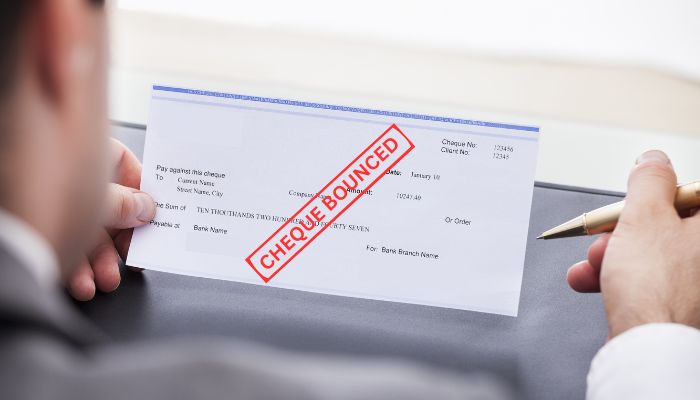Cheques have long been an integral part of financial transactions, facilitating easy and secure payments. However, when a cheque is dishonored or bounces due to insufficient funds, it can lead to various consequences, including cheque bounce charges. In this article, we will explain the cheque bounce charges.
Cheque Bounce Charges by Banks
- State Bank of India (SBI): Charges: ₹500 to ₹1,000
- HDFC Bank: Charges: ₹500 to ₹1,000
- ICICI Bank: Charges: ₹500 to ₹1,000
- Punjab National Bank (PNB): Charges: ₹300 to ₹500
- Bank of Baroda: Charges: ₹300 to ₹500
- Axis Bank: Charges: ₹300 to ₹500
- Canara Bank: Charges: ₹200 to ₹400
- Bank of India: Charges: ₹200 to ₹400
- Union Bank of India: Charges: ₹200 to ₹400
- IDBI Bank: Charges: ₹200 to ₹400
- Central Bank of India: Charges: ₹200 to ₹400
- Indian Bank: Charges: ₹200 to ₹400
- Kotak Mahindra Bank: Charges: ₹200 to ₹400
- Yes Bank: Charges: ₹200 to ₹400
- IndusInd Bank: Charges: ₹200 to ₹400
- Standard Chartered Bank: Charges: ₹200 to ₹400
- Bank of Maharashtra: Charges: ₹200 to ₹400
- United Bank of India: Charges: ₹200 to ₹400
- Andhra Bank: Charges: ₹200 to ₹400
- UCO Bank: Charges: ₹200 to ₹400
- Indian Overseas Bank: Charges: ₹200 to ₹400
- Federal Bank: Charges: ₹200 to ₹400
- Punjab & Sind Bank: Charges: ₹200 to ₹400
- Karur Vysya Bank: Charges: ₹200 to ₹400
- South Indian Bank: Charges: ₹200 to ₹400
- Jammu & Kashmir Bank: Charges: ₹200 to ₹400
- Lakshmi Vilas Bank: Charges: ₹200 to ₹400
- City Union Bank: Charges: ₹200 to ₹400
- Karnataka Bank: Charges: ₹200 to ₹400
- Catholic Syrian Bank: Charges: ₹200 to ₹400
- Tamilnad Mercantile Bank: Charges: ₹200 to ₹400
- RBL Bank: Charges: ₹200 to ₹400
- Bandhan Bank: Charges: ₹200 to ₹400
Note: Cheque Bounce penalty are subject to change, it is advisable to verify the latest charges with your respective bank.
Understanding cheque bounce charges is crucial to maintaining a healthy financial relationship with your bank and payees. By being aware of the charges imposed by various banks and taking necessary precautions to avoid cheque bounces, you can ensure smooth and hassle-free transactions.
FAQ
Cheque bounce charges are penalties imposed by banks when a cheque is returned unpaid due to insufficient funds or other reasons.
Banks charge these fees to discourage individuals from issuing cheques without sufficient funds and to cover administrative costs incurred in the cheque bouncing process.
No, the charges vary from bank to bank and can depend on factors such as the type of account, the amount of the bounced cheque, and the frequency of such incidents.
Yes, cheque bounce penalty are generally applicable to all types of accounts, including savings accounts, current accounts, and business accounts.
It is possible to dispute cheque bounce charges, but it is advisable to consult your bank and understand their specific dispute resolution process.
Some banks may consider waiving or reducing the charges on a case-by-case basis, especially if the account holder has a good banking relationship or valid reasons for the cheque bounce.
Cheque bounce charges do not directly impact your credit score. However, if the cheque bounce results in non-payment of dues or outstanding debts, it can indirectly affect your creditworthiness.
Yes, you can avoid cheque bounce charges by ensuring sufficient funds are available in your account before issuing a cheque. It is important to maintain a healthy account balance to avoid any inconvenience or penalties.
Repeated cheque bounces can have serious consequences, including legal actions, loss of credibility, and strained relationships with the payee. It can also lead to account restrictions or closures, affecting your overall banking experience.
To prevent cheque bounces, you should maintain a record of your account balance, communicate with your bank regarding any potential issues, and ensure proper funds are available before issuing a cheque. Consider alternative payment methods like online transfers or electronic payments for added convenience and security.
If your cheque bounces, you should immediately contact your bank to understand the reason for the bounce and take necessary steps to rectify the situation. It is crucial to communicate with the payee and arrange for an alternative payment method promptly.
